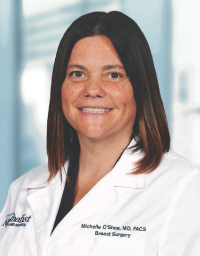Posted on Sep 28, 2021 in
FOCUS ON THE CURE

Michelle O’Shea, M.D.
Houston Methodist Breast Surgery Partners in Sugar Land
Many of us spent the past year focused on preventing COVID-19, and although we are still dealing with it, it’s time to re-focus on our total health. Making time for an annual mammogram is an important part of maintaining overall wellness and protecting yourself from breast cancer.
One in eight women will develop breast cancer over the course of their lifetime, but early detection improves the overall prognosis and often results in less aggressive treatment options.
Starting at age 40 (or younger if you have family history of breast cancer), you should talk to your doctor about getting an annual mammogram. If you have questions about your breast cancer risk, talk to your primary care doctor or obstetrician-gynecologist.
“Getting a mammogram is an important part of good breast health management and should be part of your health care priorities” said Dr. Michelle O’Shea, breast surgeon at Houston Methodist Breast Surgery Partners at Sugar Land.
When you come to Houston Methodist Breast Care Center at Sugar Land for your annual mammogram, you’ll be taken care of from start to finish. You’ll benefit from our high-tech approach to breast cancer screening with 3D mammography, which is one of the most effective tools in detecting the smallest lumps and abnormalities. And if your mammogram shows something abnormal, you have a trusted team ready to guide you through options for treatment and care. We have also made breast surgeons more accessible for women with abnormal results through extended weekday and weekend hours for reassurance and maintaining priorities for better health.
“Having everything a patient needs under one roof is a major benefit for our patients and gives us an advantage in diagnosing breast cancer at the earliest stages, which provides the best chance for complete recovery – all at one location close to home,” said O’Shea.
The breast care team works together and communicates frequently to customize each treatment plan. This collaboration helps everyone stay informed and ensures the best possible outcome.
If you have family members with cancer, you might feel that getting cancer yourself seems like a matter of time. But thankfully, family history does not mean cancer is inevitable.
“Some cancers are caused by an abnormal gene that’s passed down from generation to generation,” said O’Shea. “But it’s the abnormal gene that’s inherited, not the disease.” In any case, only 5% to 10% of all cancers are referred to as inherited cancers and may include some breast and ovarian cancers.
“Mutations occurring in the BRCA1 and BRCA2 genes are common causes of inherited cancers. Women with these mutations are more likely to develop hereditary breast and ovarian cancer syndrome,” O’Shea shared. “Most breast cancers, however, even among close relatives, are not due to these mutations.”
Genetic testing is a good idea for some people and can help with treatment options. First, research your family’s cancer history. Enlist other family members and aim to get three generations’ worth of information. For each instance of cancer, note the person’s sex, age when diagnosed, other medical conditions, diet and exercise habits, age, and cause of death. Ask your doctor about genetic testing, if you have:
- Several first-degree relatives (parents or siblings) with cancer, especially the same type.
- Family members who developed cancer at a young age.
- Close relatives with rare forms of cancer.
- A family member known to have a genetic mutation.
Houston Methodist Sugar Land Hospital’s breast care team is committed to ensuring that your experience is as stress-free as possible. The personal touch begins with your mammogram and continues throughout every aspect of care, for as long as needed.
For more information, visit https://www.houstonmethodist.org/womens-services/locations/sugar-land/breast-care-center/.


 <
<






